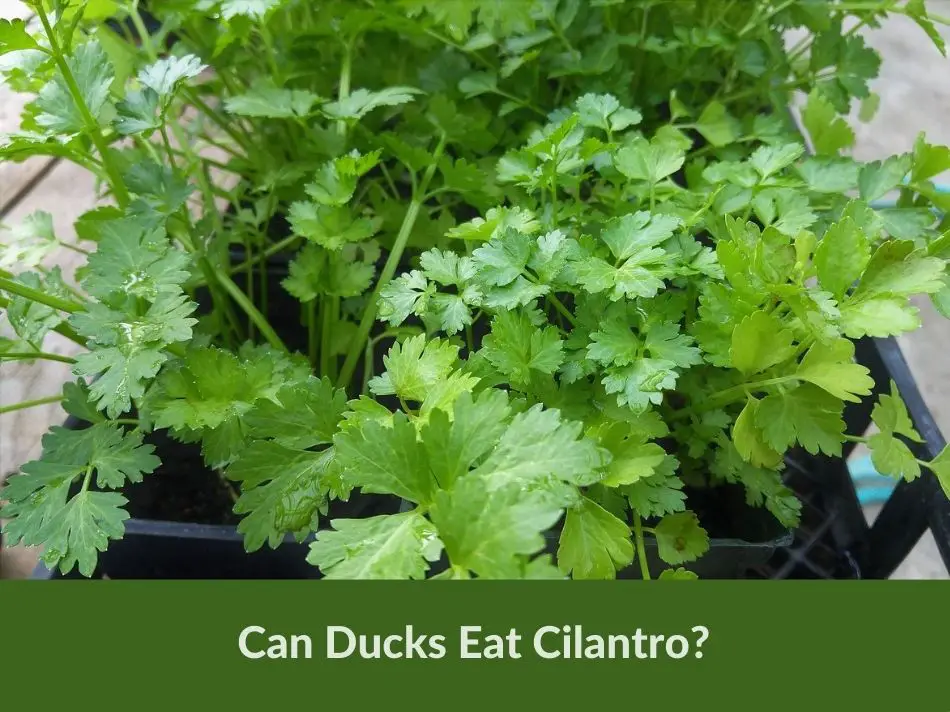Ducks are omnivorous creatures, which means they have a varied diet that includes both plants and small animals. In the wild, ducks typically feast on a mix of aquatic plants, small fish, insects, and even crustaceans. Domesticated ducks, on the other hand, are often fed a balanced diet of waterfowl pellets, grains, and vegetables. But, can ducks eat cilantro?
Yes, ducks can indeed eat cilantro. Cilantro, also known as coriander in some regions, is a herb that’s safe for ducks to consume. It’s not toxic to them, and many ducks seem to enjoy its fresh, zesty flavor.
In this article we will learn more about ducks cilantro and the health benefits of doing so.
How Often Can I Feed My Ducks Cilantro?
While cilantro is safe for ducks, it shouldn’t make up the bulk of their diet. You can give cilantro as a treat 1-2 times a week. A good rule of thumb is to not give ducks treats that exceeds 10% of their diet.
Can Ducklings Eat Cilantro?
Ducklings have a more sensitive digestive system than mature ducks. While cilantro isn’t harmful to ducklings, it’s best to wait until they are a bit older before introducing them to this herb. When they reach about 4-6 weeks of age, you can start offering small amounts of cilantro, finely chopped, and always under supervision
Cilantro Nutritional Value
Below is the nutritional value of one cup cilantro.
- Calories: 23 calories
- Fat: 0.5 grams
- Carbohydrates: 3.7 grams
- Protein: 2.1 grams
It also contains several vitamins and minerals as listed below.
- Potassium
- Vitamin A
- Vitamin C
- Vitamin K
- Calcium
- Iron
- Magnesium
Is Cilantro Healthy for Ducks?
Cilantro is healthy for ducks when fed in moderation. Below are the benefits all the minerals and vitamins found in cilantro.
- Potassium: Ah, potassium, a real feather-friend for our web-footed pals! Essential for maintaining proper muscle function, potassium ensures that our ducks paddle smoothly across ponds. A deficiency might lead to muscle weakness, so it’s crucial for keeping those wings flapping and feet waddling.
- Vitamin A: Every duck’s dream for dazzling vision! Vitamin A plays a pivotal role in maintaining healthy eyesight, especially during those twilight hours. It also supports skin and feather health, ensuring our ducks remain the epitome of pond elegance.
- Vitamin C: While ducks naturally produce some Vitamin C, a little boost never hurts. It’s a quacking good antioxidant, helping fend off oxidative stress and supporting overall health. It’s like giving our ducks a tiny shield against the challenges of the wild.
- Vitamin K: A must-have for any duck’s bill-to-tail well-being! Vitamin K is essential for blood clotting. So, if a duck gets a minor scrape while foraging or playing, this vitamin ensures they’re back to their buoyant selves in no time.
- Calcium: Think of it as the building block for sturdy duck bones and those iconic beaks. Calcium is vital for egg-laying ducks too, ensuring their eggs have strong shells. A duck without enough calcium is like a pond without water – simply incomplete!
- Iron: Iron keeps our ducks’ energy soaring sky-high! It’s essential for hemoglobin formation, which transports oxygen in the blood. A well-oxygenated duck is an active, happy duck, ready to dive and dabble all day long.
- Magnesium: Last but not least, magnesium is the unsung hero of duck relaxation. It plays a role in nerve and muscle function, ensuring our feathered friends remain calm, cool, and collected, even when the pond gets a bit ruffled.
How To Feed Cilantro To Ducks
- Wash Thoroughly: Always ensure that the cilantro is free from pesticides and other chemicals. Wash it thoroughly under running water.
- Chop or Leave Whole: For adult ducks, you can offer cilantro whole or roughly chopped. For younger ducks, it’s better to finely chop the cilantro to make it easier for them to eat.
- Mix with Other Foods: You can mix cilantro with other safe vegetables or grains to make a tasty treat for your ducks.
- Observe: Always observe your ducks when introducing a new food. If you notice any adverse reactions or changes in behavior, it might be best to remove that food from their diet.
More Herbs & Plants Ducks Can Eat
Here are some herbs and plants that ducks can enjoy:
- Alfalfa – A nutrient-dense plant that provides essential vitamins and minerals.
- Hostas – A leafy plant that ducks enjoy nibbling on.
- Lavender – A fragrant herb that can have calming effects on ducks.
- Lilacs – A flowering plant that adds variety to a duck’s diet.
- Petunias – A colorful plant that ducks can safely consume.
Make sure to check out our full list of flowers and plants that ducks can eat.
Conclusion
In conclusion, cilantro can be a delightful treat for your ducks, offering both flavor and nutritional benefits. With a balanced diet and occasional treats like cilantro, your ducks will lead a happy and healthy life. Quack on!
Disclaimer: The information in this article is for informational purposes only. I'm not an expert or a veterinarian.

